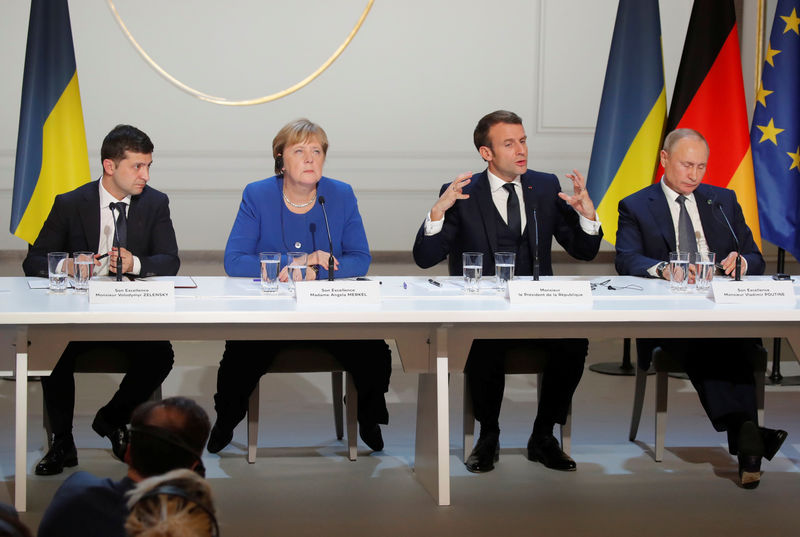By John Irish and Margaryta Chornokondratenko
PARIS (Reuters) - The leaders of Russia and Ukraine agreed on Tuesday to exchange all remaining prisoners from the conflict in east Ukraine by the end of the year, but left thorny questions about the region's status for future talks.
Russia's Vladimir Putin and Ukrainian President Volodymyr Zelenskiy, in their first face-to-face meeting, took part in nine hours of talks in Paris, brokered by French President Emmanuel Macron and German Chancellor Angela Merkel.
The conflict in eastern Ukraine that broke out in 2014 has killed more than 13,000 people, left a large swathe of Ukraine de facto controlled by Moscow-backed separatists and aggravated the deepest east-west rift since the Cold War.
The body language between Putin and Zelenskiy, a comedian-turned-politician elected earlier this year on a promise to resolve the conflict, was chilly. There was no public handshake, and they avoided eye contact.
But the talks did deliver specific commitments. A final communique set out the prisoner exchange and a renewed commitment to implement an existing ceasefire agreement in eastern Ukraine's Donbass region that has never fully taken hold as well as enhanced powers for international ceasefire monitors.
The sides also said they had agreed, over the next four months, to work toward local elections in Donbass, a major stumbling block up to now. There were no details though on how the votes would be conducted, and Macron acknowledged there were still disagreements on the subject.
"We have made progress on disengagement, prisoner exchanges, ceasefire and a political evolution," Macron said at a news conference at which Zelenskiy and Putin sat separated by Merkel and Macron. "We have asked our ministers in the coming four months to work on this."
In addition, Zelenskiy said he and Putin had worked out the outline of an agreement that would allow the transit of Russian natural gas to continue across Ukrainian soil. He gave no details. A member of the Russian delegation said officials had been instructed to hammer out details.
However, there was no definitive agreement on the political issues that stand in the way of resolving the conflict. These include the status of Donbass within Ukraine and who should de facto control the border between Donbass and Russia.
Another round of talks in the so-called Normandy format, brokered by France and Germany, will be held within four months.
PEACE ELUSIVE
Ukraine's industrial Donbass region spun out of Kiev's control in 2014, soon after street protests ousted a pro-Moscow leader in the Ukrainian capital and Russia sent in armed men to seize Ukraine's Black Sea Crimea region.
A 2015 ceasefire deal was signed in Minsk, the capital of Belarus. But fighting still flares up in Donbass four years on, and a peace deal has been elusive. Monday's summit was the first time the four leaders have met under the Normandy format since 2016.
Many Ukrainians are concerned about compromising with Russia. They see Putin as an aggressor seeking to restore the Kremlin's influence on the former Soviet republic and ruin Ukraine's aspiration for closer European ties.
Protesters who have warned Zelenskiy about making concessions to Putin in Paris were camped outside the presidential administration in Kiev, watching the summit news conference on a big screen.
Zelenskiy, who sparred verbally with Russian journalists at the news conference, said he had given no ground on Ukraine's sovereignty or territorial integrity. He said he and Putin had disagreed on several issues.
Asked who triumphed in their exchanges, Zelenskiy said: "I don't know who (beat) who. I think it would be appropriate to be diplomatic as we've just started talking. Let's say for now it's a draw."
Putin, for his part, is unwilling to be seen to bend to outside pressure over eastern Ukraine, and he does not want to be seen to be leaving the Russian-speaking population of Donbass at the mercy of the Kiev government.
He expressed only cautious hope for the peace talks. "All this gives us the grounds to suppose that the process is developing in the right direction," he said.

Sticking to his cool tone, when he ended his remarks to journalists in Paris, Putin thanked Merkel and Macron warmly but offered no pleasantries to Zelenskiy.